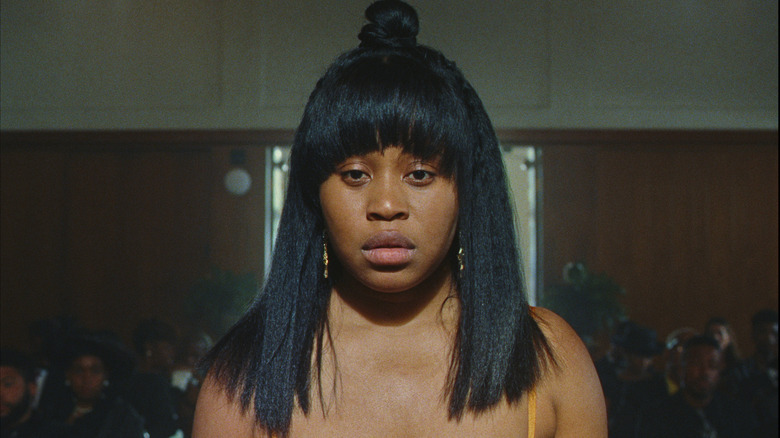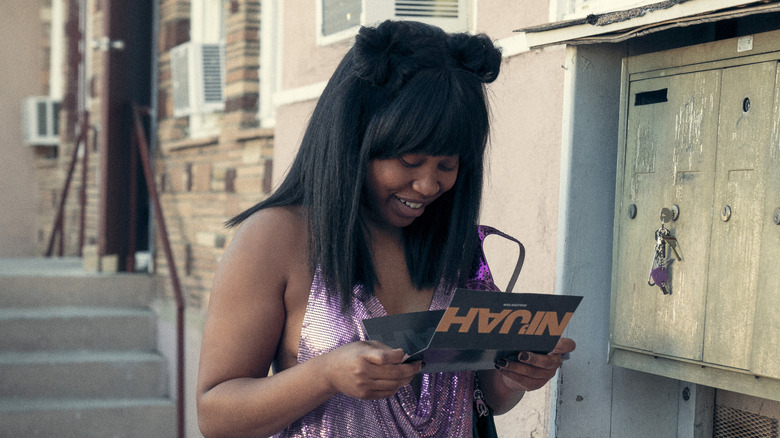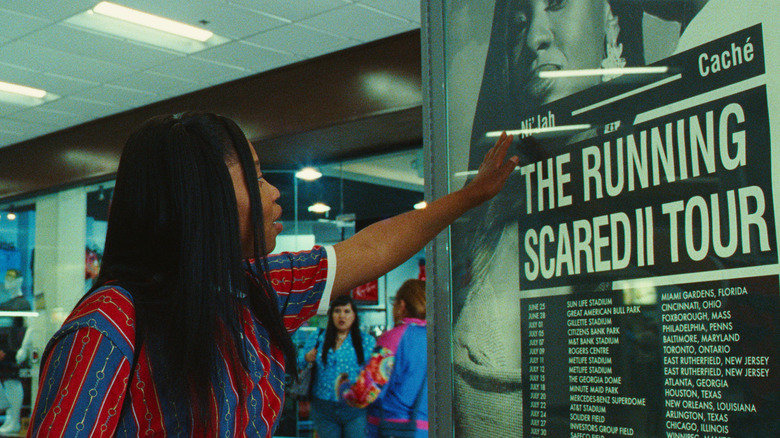Is Swarm Based On A True Story? The Truth Behind Its Disturbing Inspirations
The Prime Video original limited series "Swarm" is a deeply disturbing look at the intensity of one fan's love for her favorite musical artist, and despite its more outlandish elements, it feels all too real. Dominique Fishback stars in the show as Andrea "Dre" Greene, an emotionally volatile young woman who's so obsessed with the singer Ni'jah (Nirine S. Brown) that she ends up going on a murderous rampage. Much like "Atlanta" (which was created by Donald Glover, who also co-created "Swarm" with "Atlanta" writer Janine Nabers), "Swarm" uses surrealism to blur the lines between fact and fiction. Case in point: Ni'jah was clearly inspired by real-life singer Beyoncé, right down to her fandom being called the "Killer Bees" and "The Swarm," much like Beyoncé's "BeyHive."
Of course, there's enough chaos in the news that a story about an overzealous fan committing murder in the name of their fandom feels like something that could slip through the cracks. After all, real-world super-fans have done terrible things before (like, perhaps most notoriously, that time the president of Tejano singer Selena's fan club killed the talented young singer), which in turn begs the question: Is Dre based on a real person? Let's take a look.
Is Swarm's Dre a real person?
In "Swarm" episode 6, the narrative switches and we see a true crime documentary about Andrea, including a segment where Glover, playing himself, says he's making a series about her life. It's kind of like the Emmy-winning "Atlanta" episode "B.A.N.," which features a television show within the "Atlanta" universe, or the season 4 episode "The Goof Who Sat By the Door." The only difference, however, is that it doesn't just make the show's world feel more lived-in, but it also makes it almost feel real.
With that being said, Dre is not a real person, and the events of "Swarm" are a work of fiction, no matter how much the show tries to confuse viewers. During an interview with the Los Angeles Times, Nabers explained the process behind creating "Swarm" and its almost too-convincing storytelling:
"We did research for months to basically find events within a 2 1/2 year period that we could put our main character into. So, it's really not a work of fiction. We've taken real internet rumors, real murders, and combined them in the narrative of our main character, Dre. Not much of it is fabricated."
So, although Dre isn't real, she is sort of a mixture of real people and real stories of fans who took things too far. The original inspiration for "Swarm" came in part from a since-debunked internet rumor that popped up after the release of Beyoncé's "Lemonade," claiming that a fan named Marissa had died by suicide because she realized that Beyoncé was allegedly being cheated on by her husband, Jay-Z. In "Swarm," Dre's foster sister Marissa (Chloe Bailey) similarly dies by suicide after Dre informs her that her fiancé has been cheating on her, drawing almost directly from that same false rumor.
Swarm's fictional events are inspired by an unfortunate reality
While there are many fictional movies and shows with the "any resemblance to persons living or dead is unintentional" card somewhere to avoid litigation, "Swarm" had to take it a step further, stating, "While this story is inspired by certain actual events, it is a work of fiction," before going on to clarify any similarities are coincidental or unintentional. Indeed, the similarities between Ni'jah and Beyoncé are lengthy (from her surprise visual album drop to her concert outfits), but again, what about the murders?
In an interview with Variety, Nabers said that "every episode, with the exception of episode 4, has a true foundation for its murder." (Episode 4 was written by Malia Obama and features singer Billie Eilish as the leader of a feminist cult where things end in serious bloodshed. The whole thing is pure chaos.) Each murder was likewise based on some real-life murder, which gives the series an additional layer of authenticity even as it changes details to fit its overall narrative. That's a gruesome creative decision but one you can almost feel in the series, which is deeply unsettling at every turn.
Nabers has also noted that she and Glover saw "Swarm" as an opportunity to look at a serial killer story from a Black woman's perspective, which is something we really hadn't seen before. At the same time, they made sure to ground it in a way that made it feel just as believable (or even more believable) than something like "Dexter" and its many other TV serial killer peers.


